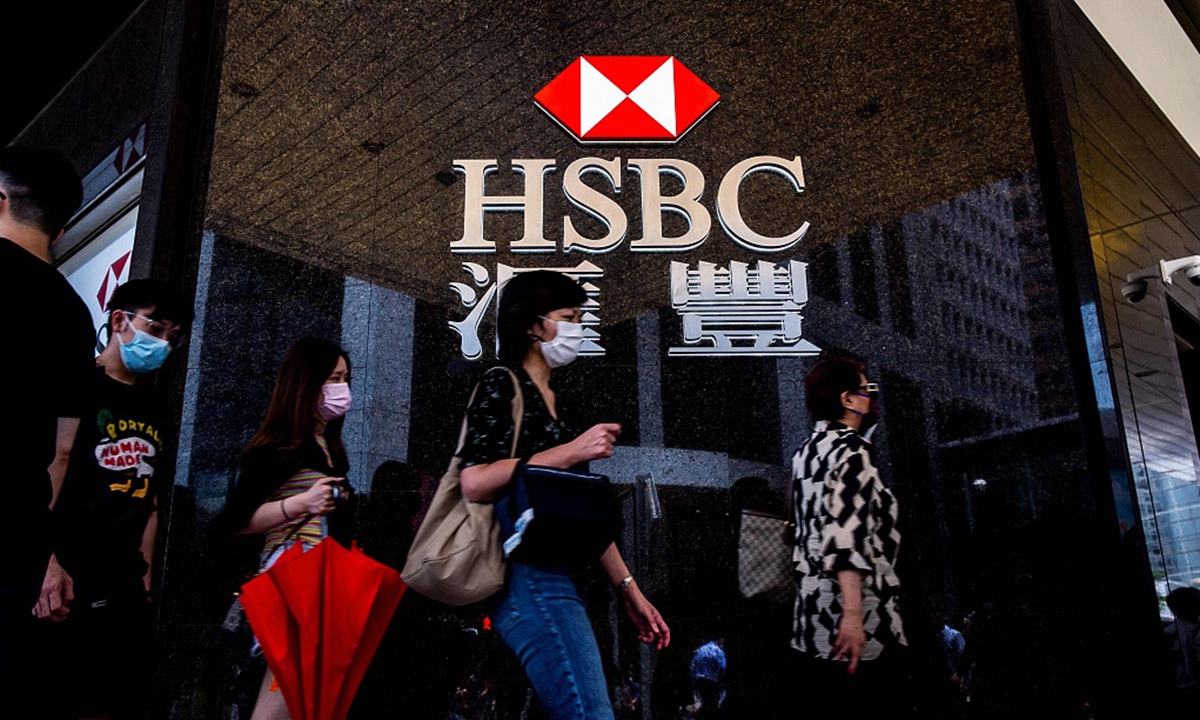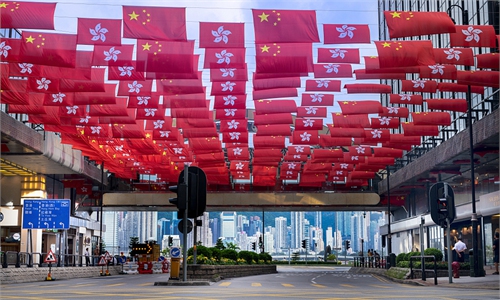HK banks requested to disclose assets and properties of offenders of the National Security Law, not likely to affect status as international business center

Pedestrians walk past the logo for HSBC outside a local branch bank in Hong Kong on August 2, 2021. Photo: VCG
The Hong Kong Association of Banks has recently updated its documents to include new requirements under the National Security Law for Hong Kong, requesting banks to disclose clients' properties to law enforcement agencies if they learn the clients have been arrested or charged for crimes against national security.
Legal and financial experts point out that the addition of this provision is one of the supporting regulations of the National Security Law and helps address the occurrence of crimes endangering national security in advance and will not hurt Hong Kong's status as an international business center.
The Hong Kong Association of Banks (HKAB) updated the regulation on October 22 on its official website. Compared with the previous version published in May, the new version says that, if a bank has knowledge or suspects that a person has been arrested or charged for an offence endangering national security, or if a property is related with an offence, it has the obligation to disclose the information to law enforcement agencies.
"The banking industry is in constant communication with regulatory and law enforcement agencies on various matters such as the recent crackdown on money laundering and terrorist fund raising," a spokesperson of the HKAB told the Global Times on Monday, adding that "the Hong Kong Monetary Authority (HKMA) and banking sector discuss implementation issues with stakeholders including law enforcement agencies in the AML/CFT ecosystem from time to time as per international practices." .
Although the HKAB did not list the consequences of violating the relevant regulations, according to the National Security Law for Hong Kong, anyone who knows or suspects that any property is related to criminal activities without disclosing it to the police, can be fined HK$50,000 ($6,432) and imprisoned for three months.
"Requiring banks to declare suspicious funds is a practice adopted by many Western countries and is a long overdue addition to the banking industry in Hong Kong," Liang Haiming, Chairman of the China Silk Road iValley Research Institute, told the Global Times on Monday.
"Only by freezing the assets and sources of funds of the wrongdoers as early as possible can we effectively stop crime from happening."
At the same time, experts believe this move will not affect Hong Kong's status as an international financial center.
Other international financial centers such as New York, London and Singapore all have similar provisions, Liang said, noting that no country or region would allow the funds of criminals and potential rioters to go unmonitored.
Being a statutory organization in the banking sector in Hong Kong, HKAB's requirements are mandatory for banks operating in the city, Kennedy Wong Ying-ho, solicitor of the Supreme Court of Hong Kong, told the Global Times on Monday, noting that if any bank refuses to follow the requirements it cannot operate in the city anymore.
All licensed banks approved by the HKMA to operate in Hong Kong must be members of the HKAB. As of the end of December 2017, the association has 155 registered banks.
Previously, banks that disclosed personal assets could be sued by customers for privacy. This matter is now resolved as the law enforcement has been granted greater powers, Wong said.
In response to enquiries from Hong Kong media, the HKBA stated that the banking industry often maintains communication with regulatory and law enforcement agencies on different matters. The HKMA stated that the institution and the banking industry will communicate with relevant personnel, including law enforcement agencies, on anti-money laundering and terrorist financing issues from time to time. This is also a common international practice. This update in the regulation is in response to recent concerns of the banking industry and is consistent with previous practices.
According to local media, since the implementation of the National Security Law, the Hong Kong police have frozen about HK$ 400 million ($51.46 million) related assets.
On May 14, the then Hong Kong Security Director, John Lee Ka-chiu, invoked for the first time the National Security Law to freeze the shares of Next Media held by Jimmy Lai and the properties in the Hong Kong bank accounts of the three companies he owned, which were estimated to exceed HK$300 million. Since then, the Security Bureau has invoked the national security law and frozen the property and factories of three companies, including Apple Daily.

Pedestrians walk past the logo for HSBC outside a local branch bank in Hong Kong on August 2, 2021. Photo: VCG
The Hong Kong Association of Banks has recently updated its documents to include new requirements under the National Security Law for Hong Kong, requesting banks to disclose clients' properties to law enforcement agencies if they learn the clients have been arrested or charged for crimes against national security.
Legal and financial experts point out that the addition of this provision is one of the supporting regulations of the National Security Law and helps address the occurrence of crimes endangering national security in advance and will not hurt Hong Kong's status as an international business center.
The Hong Kong Association of Banks (HKAB) updated the regulation on October 22 on its official website. Compared with the previous version published in May, the new version says that, if a bank has knowledge or suspects that a person has been arrested or charged for an offence endangering national security, or if a property is related with an offence, it has the obligation to disclose the information to law enforcement agencies.
"The banking industry is in constant communication with regulatory and law enforcement agencies on various matters such as the recent crackdown on money laundering and terrorist fund raising," a spokesperson of the HKAB told the Global Times on Monday, adding that "the Hong Kong Monetary Authority (HKMA) and banking sector discuss implementation issues with stakeholders including law enforcement agencies in the AML/CFT ecosystem from time to time as per international practices." .
Although the HKAB did not list the consequences of violating the relevant regulations, according to the National Security Law for Hong Kong, anyone who knows or suspects that any property is related to criminal activities without disclosing it to the police, can be fined HK$50,000 ($6,432) and imprisoned for three months.
"Requiring banks to declare suspicious funds is a practice adopted by many Western countries and is a long overdue addition to the banking industry in Hong Kong," Liang Haiming, Chairman of the China Silk Road iValley Research Institute, told the Global Times on Monday.
"Only by freezing the assets and sources of funds of the wrongdoers as early as possible can we effectively stop crime from happening."
At the same time, experts believe this move will not affect Hong Kong's status as an international financial center.
Other international financial centers such as New York, London and Singapore all have similar provisions, Liang said, noting that no country or region would allow the funds of criminals and potential rioters to go unmonitored.
Being a statutory organization in the banking sector in Hong Kong, HKAB's requirements are mandatory for banks operating in the city, Kennedy Wong Ying-ho, solicitor of the Supreme Court of Hong Kong, told the Global Times on Monday, noting that if any bank refuses to follow the requirements it cannot operate in the city anymore.
All licensed banks approved by the HKMA to operate in Hong Kong must be members of the HKAB. As of the end of December 2017, the association has 155 registered banks.
Previously, banks that disclosed personal assets could be sued by customers for privacy. This matter is now resolved as the law enforcement has been granted greater powers, Wong said.
In response to enquiries from Hong Kong media, the HKBA stated that the banking industry often maintains communication with regulatory and law enforcement agencies on different matters. The HKMA stated that the institution and the banking industry will communicate with relevant personnel, including law enforcement agencies, on anti-money laundering and terrorist financing issues from time to time. This is also a common international practice. This update in the regulation is in response to recent concerns of the banking industry and is consistent with previous practices.
According to local media, since the implementation of the National Security Law, the Hong Kong police have frozen about HK$ 400 million ($51.46 million) related assets.
On May 14, the then Hong Kong Security Director, John Lee Ka-chiu, invoked for the first time the National Security Law to freeze the shares of Next Media held by Jimmy Lai and the properties in the Hong Kong bank accounts of the three companies he owned, which were estimated to exceed HK$300 million. Since then, the Security Bureau has invoked the national security law and frozen the property and factories of three companies, including Apple Daily.

